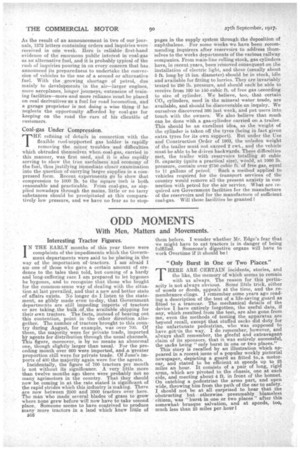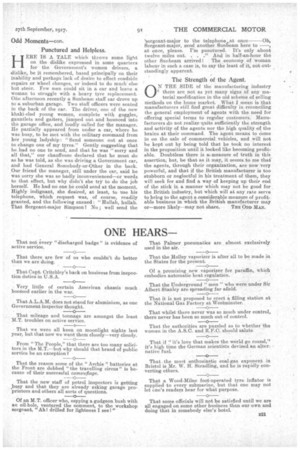ODD MOMENTS
Page 2

Page 3

If you've noticed an error in this article please click here to report it so we can fix it.
With Men, Matters and Movements.
Interesting Tractor Figures.
IN THE EARLY months of this year there were complaints of the impediments which the Government departments were said to be placing in the way of the importation of tractors. I am afraid I am one of those who gave a certain amount of credence to the tales then told, but coming of a hardy and long-suffering race I am prepared to let bygones be bygones, and to recognize that those who fought for the common-sense way of dealing with the situation at last prevailed, and that a new and better state of affairs exists. No longer do I listen to the statement, as glibly made even to-day, that Government departments are still impeding imports of tractors or are taking, the bulk .of,the available shipping for their own tractors. The facts, instead of bearing out this contention, point in the other direction altogether. The number of tractors brought to this country during August, for example, was over 700. Of these, the majority were for private trade, imported by agents for distribution through the usual channels. This figure, moreover, is by no means an abnormal one, though slightly larger than usual. For the preceding month over 600 were imported, and ,a greater proportion still were for private trade. Of June's imports of 400 the majority again.were for the agents. Incidentally, the figure of 700 tractors per month is not without its significance. A very little more than twelve months ago there were probably not so many agrimotors in the country. That they should now be coming in at the rate stated is significant of. -the rapid strides which this industry is making_ There are now between 2500 and 3000 tractors over here. The rain who made several blades of grass to grow where none grew before will now have to take second place.. Someone seems to have contrived to produce many more tractors in a land which knew little of B16 them before. I wonder whether Mr. Edge's fear that we might have to eat tractors is in danger of being fulfilled. Someone's digestive organs will have to work Overtime if it should bel
"Only Burst in One or Two Places."
THERE ARE CERTAIN incidents, stories, and the like, the memory of which seems to remain with us always. The reason for this pertinacity is not always obvious. Some little trick, either of woods or deeds, appeals at the time, and the remembrance clings. I remember some years ago reading a description of the test of a life-saving guard as fitted to a tramcar. The mechanical details of the device I have entirely forgotten, the useful data, if any, which resulted from the test, are also gone from me, even the methods of testing the apparatus are beyond recall, except that stuffed sacks did duty for the unfortunate pedestrian, who was supposed to have .got.in the way. I do remember, however, and always shall remember, the gleeful and extravagant claim of its sponsors, that it was entirely successful, the sacks being "only burst in one or two places." This story is recalled by an illustration which appeared in a recent issue of a popular weekly pictorial newspaper, depicting a guard as fitted to a motorcar, and stated to be efficient at speeds up to 25 miles an hour. It consists of a pair of long, rigid arms, which are pivoted to the chassis, one at each side, and meeting about 4 ft. in front of the bonnet. On catching a pedestrian the arms part, and open wide, throwing him frorn the path of the car to safety. " I should not be at all surprised to hear that the obstructing but otherwise presumably blameless citizen, was "burst in one or two places" after this somewhat brusque salvation, and at speeds, too, much less than 25 miles per hour I HERE IS A TALE which throws some light on the dislike expressed in some quarters for the Government's women drivers, a dislike, be it remembered, based principally on their inability and perhaps lack of desire to effect roadside repairs or wheel changes, or indeed to do much' else but steer. Few men could sit in a car and leave a woman to struggle with a heavy tyre replacement. One afternoon recently a Sunbeam staff car drove up toa suburban garage. Two staff officers were seated in the back of the car. The driver, one of the new khaki-clad young women, complete with goggles, gauntlets and gaiters, jumped out and bounced into the garage office, and loudly called for the manager. He parlially appeared from under a car, where he was busy, to be met with the military command from her young ladyship : "Send someone out at once to change one of my tyres." Gently suggesting that he had no one to send, and that he was "sorry and all that," our chauffeuse declared that he must do as he was told, as she was driving a Government car, and had General Somebody-or-Other in the back. Our friend the manager, still under the car, said he was sorry she was so badly inconvenienced—or words to that effect, but why didn't she try to do• the job herself. He had no one be could send at the moment. Highly indignant, she desired, at least, to use his telephone, which request was, of course, readily granted, and the following ensued : "Hullah, hullah. That Sergeant-major Simpson? No; well send the 'sergeant-major to the telephone,Lat once Oh, Sergeant-major, send another Sunbeam here to —, at once, please. I'm punctured. It's only about twelve miles out. . . ." And in half-an-hour the other Sunbeam arrived! The economy of woman labour in such a case is, to say the least of it, not out. standingly apparent.
The Strength of the Agent.
0 N THE SIDE of the manufacturing industry I there are not as yet many signs of any material modification in the old scheme of selling methods on the home market. What I mean is that manufacturers still find great difficulty in reconciling the general employment of agents with the need for offering special terms to regular customers. Manufacturers do not realize quite sufficiently the strength and activity of the agents nor the high quality of the brains at their command. The agent means to come in on the sale of commercial vehicles, and will not be kept out by being told that he took no interest in the proposition until it looked like becoming profitable. Doubtless there is ai measure of truth in this assertion, but, be that as it may, it seems to me that' the agents, through their organization, are now very powerful, and that if the British manufacturer is too stubborn or neglectful in his treatment of them, they will seek for and find a way of keeping up their end of the stick in a, manner which may not be good for the British industry, but which will at any rate serve to bring to the agent a considerable measure of profitable business in which the British manufacturer may or—more likely—may not share. Tim ODD MAN.






















